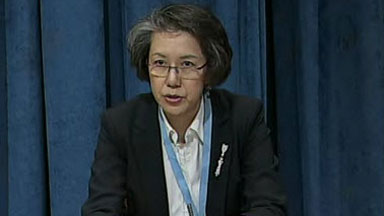A child psychologist from South Korea, Yanghee Lee, has been appointed to take over from Tomas Ojea Quintana as United Nations Special Rapporteur to Burma as from 1 June, DVB has learned.
Lee was selected on Thursday from a list of candidates that included career diplomats, former Suu Kyi lawyer Jared Genser, and British activist-academic Guy Horton.
Although a participant in ASEAN fora, Lee would appear to have little experience in dealing with Burma or its government. She was first elected to the Committee on the Rights of the Child in 2003 and later became chairperson.
Lee’s background is in child psychology and education, and she is a BSc graduate of Georgetown University in Washington, DC.
Shortlisted candidate Guy Horton said, “Congratulations are due to Ms Lee on the appointment. She is taking over a very difficult situation. It should be noted that Mr Quintana has called for an investigation into crimes against humanity in Rakhine [Arakan] State, and I hope she will take that forward.”
The Korean inherits a position fraught with controversy. Quintana frequently faced criticism from Naypyidaw and from Burma’s Buddhist majority for his stance toward the Rohingya Muslims.
Leaving the position, Quintana wrote in March that Burma’s nascent democracy faces immense challenges in the coming years, some with the capacity to “jeopardise” progress made since the country’s transition from military dictatorship to quasi-civilian leadership in 2011.
“In assessing the reforms that have been initiated so far,” he wrote, “the Special Rapporteur stresses that this can only be viewed as the start of a long process of reform that will be required to address the deep seated human rights issues in Myanmar [Burma].”
[related]
Quintana noted that throughout his six years on the UN mandate, he has seen significant changes in Burma that have brought important improvements to the human rights situation, including the release of over 1,100 prisoners of conscience, the opening up of space for freedom of expression, the development of political freedoms, the holding of free and fair by-elections, and important progress in securing an end to fighting in the ethnic border areas.
He said he believes that there is limited space for backtracking, though the democratic transition is still in its early stages and remains fragile.
“A change of mind-set still needs to take place within all levels of Government to allow civil society, political parties and a free media to flourish beyond the limited freedoms that have currently been granted,” he concluded. “The energy and enthusiasm of the younger generation and of women needs to be allowed to come through which will, in turn, reinvigorate the reform process and ensure that Myanmar [Burma] secures a successful transition. As part of this transition, addressing the past will also become increasingly important.
“A critical step will be to secure ceasefire and political agreements with ethnic minority groups, so that Myanmar can finally transform itself into a peaceful multi-ethnic and multi-religious society.”



